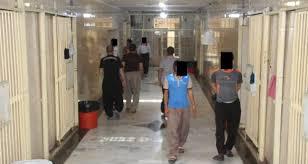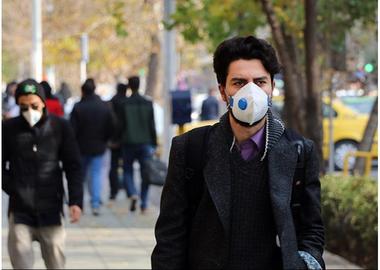Iranian media has reported on the high rates of suicide in Ilam province — the highest in the country — for several years now. Poverty, economic hardship and violence have been cited as key factors driving up the numbers.
In recent years, the statistics on suicide in Ilam — and in particular, suicide by self-immolation — revealed that high numbers of women were killing themselves. But in recent years, there have been increasing numbers of men committing suicide as well.
As Iran began to deal with the coronavirus outbreak earlier this year, authorities released or granted temporary leave to thousands of prisoners incarcerated for non-violent crimes. Some of them have told IranWire that suicide is a common and normal phenomenon in Ilam Central Prison. The number of suicides in the city suggests that the practice is linked to cultural factors, whether it takes place in prison or not.
***
"Two months ago, a prisoner named Hamid Piri, who was sentenced to death for murder, committed suicide by taking [aluminum phosphide] pills in solitary confinement before the sentence was carried out,” one inmate at Ilam Central Prison told me. “Self-inflicted death among the inmates of this prison happens a lot. How can a person in quarantine have access to pills that can kill them? How do objects that can be used for suicide get into prison? Many are in prison for ordinary robbery or altercations and hang themselves. Death happens easily in this prison. Suicide, self-harming, and serious conflicts are commonplace.” The same prisoner said he thought prison authorities might be making it possible for inmates to kill themselves, providing them with the means to do so.
Ilam Central Prison has women's and children's wards, which are separate from the men's section. The men's section consists of five wards, and in theory, criminals are split up according to the type of crimes they have committed: one holds criminals serving time for financial crimes, while two others house inmates found guilty of other, more “general” crimes.
According to prisoners who have served time in the prison, the separation of inmates according to their crime is not observed, and there is only one health center to serve the entire prison complex. Prison conditions are so dire that more than 40 prisoners are held in one of the three rooms in the medical ward, and they share one shower and three toilets. The ward also has a small outdoor space with three public telephones. Prisoners have to line up outside, often in the rain or snow, to make a call.
What Human Rights?
Failure to respect the basic rights of prisoners, disregard for their protests and demands, and poor sanitation are shared themes in most prisoners' narratives. They say that prisoners themselves have to equip the prison with the basics. "Prisoners provide toiletries, washing liquid, light bulbs, blankets, and carpets. The head of the prison, who openly opposes the demands and protests of the prisoners, says that, when it comes to granting leave, whether or not a prisoner has taken part in providing equipment for the prison is taken into consideration. Some inmates equip the prison to get their basic rights. When we protested and asked for items such as soap to be provided by the prison, the head of the prison himself said that they would send back whatever they were sent. In their view, the prisoners do not deserve their rights.”
One prisoner who had recently been released told IranWire that since March 2020, as news emerged that coronavirus was spreading in Iran’s prison populations across the country, prison officials, contrary to official claims, were not disinfecting the wards. "Even the prison staff did not have gloves or masks,” he said. “There was not enough washing liquid and sanitary products, which were normally distributed among prisoners, were not given out.
"The prison is like a separate state and does not follow Prisons Organization regulations," he said. "Even when we protest, they treat us as if the prisoners do not deserve their basic rights."
The current director of Ilam Central Prison is Safdar Fooladi, who was appointed in March 2020, but the people I spoke to did not express any hope that the situation would change.
False Claims in Prison (And Out)
Another former prisoner told me about the suicides he had witnessed, and about the authorities who make it possible. "Part of the prison staff's income is paid by the prisoners. The staff give prisoners psychotropic drugs and things that can be used for violence, self-harm, and suicide. I saw a machete while I was in prison. Weapons are easily delivered to prisoners. Serious fights are common, and no news comes out of prison. News of suicides circulates among inmates, and since many inmates come from deprived communities, they have no contact with the wider world or the media — or their families are threatened into silence. So there is no news of them.”
Meanwhile, prison officials present their own narratives about the province's prisons, including Ilam Central Prison. As Iranian officials were offering the country misleading updates on the extent of the coronavirus outbreak and the access to tests, Mehdi Tofiqzadeh, the director general of Ilam prisons, said on February 21 that in order to prevent the spread of coronavirus, all detention facilities will be disinfected and any prisoner that was transferred in or out of the prisons would be tested for the virus. He went on to say that sterile clothing was being supplied to prisoners, soldiers working in the prison, and general staff.
Tofiqzadeh also claimed that medical teams were stationed in prisons to prevent the spread of the virus, and that the prisoners' health was being continuously monitored.
Following this, Ali Dehghani, the Chief Justice of Ilam Province, also emphasized in April 2020 that procedures for preventing the spread of the virus in the province’s prisons were being followed, that prisoners’ requests were being investigated and their problems being resolved in cooperation with, and with support from, judicial authorities.
As in wider society, prisoners’ accounts expose the claims of the authorities as untrue.
"Ilam Central Prison has only one medical center, and you have to be in a miserable state in order to be transferred there. Diseases such as hepatitis and AIDS are also prevalent. No action is taken to address a simple flu in prisoners."
Speaking at the end of April, he said: "Drugs are easily available. The use of shared syringes or unsafe sex leads to more spread [of diseases and illnesses]. There is no cure for a cold or flu. In the worst cases, a paramedic comes [into the cell], examines the symptoms, and gives out a pill. If injections are needed, they are given in front of all inmates in the same unsanitary environment. There are old men in prison who need medical attention, but no action is being taken.”
“Suicide is Also a Pandemic”
In December 2019, Haidar Teymouri, an imprisoned dervish, released an audio file describing the prison's dire conditions: "It's a disaster. I got flu for 10 days. The virus was spread in the ward, the paramedic was sent and [treated us] from behind the door. They don't pay attention to our words. They shaved the heads of prisoners who protested and took them out to the public halls as punishment. The public hall is our side ward, with a population of 140 people, and only 50 beds."
Political activist Farshad Dustipour, also from Ilam, was arrested several times when he protested as a student, and since, when he has tried to report on protests. He told IranWire that he had witnessed the humiliating behavior of the prison authorities, including at Ilam Central Prison, where he was held for a night.
Given the widespread culture of suicide in the province, it is easy for prisoners to begin considering it: "For a bankrupt person in Ilam prison, the first idea is suicide, while in Tehran this decision might be the last option, the last thing that comes to the mind for a prisoner."
According to him, currently the main factor driving the prevalence of suicide is economic problems and the lack of job security. He says it’s not just coronavirus that has gripped the country. "Suicide is also a pandemic. When suicide happens a lot, it's easier to do it. When a person goes bankrupt, he thinks that life is no longer worth living and that he will not have a chance to make up for it. I knew a rich man who could not get help from his family after his bankruptcy and committed suicide. I saw a mother who committed suicide because of her children, a father who killed his sons out of grief, a daughter who ended her life due to family disputes, and even children, a boy, who died after several clashes with his sister. Even as a child, I told my mother that I would commit suicide if my wishes were not granted. Suicide in Ilam is even used to threaten people."
Dustipour says there are also examples of people trying to end their lives out of pride. "A friend of ours was diagnosed with cancer and decided to kill himself so that instead of paying for the treatment, his family would benefit from the [insurance] money. The man's wife was not even shocked — she already knew. After taking a trip with his family, the man put on his uniform and ended his life with a gun."
He says this culture of suicide extends to Chaharmahal and Bakhtiari province and Kurdistan. So, again, it’s easy to see how it feels natural in the prisons. "Although Ilam prison is not worse than Kermanshah’s prisons, because there is a culture of suicide, even as a way to threaten, we can see this happens more in prisons here.”
As with the others I spoke to, he points to a blatant disregard for human rights and severe mistreatment of prisoners. “In the protests against the increase in gas prices during the presidency of Mahmoud Ahmadinejad, the detainees were to be transferred to prison. The weather was very hot, and they were transported in large numbers in iron containers. Some people died in the containers and two bodies were found in Ilam Dam. The news was never published."
If a prisoner is not a well-known person in his or her community, the news about prison conditions never gets out; it’s never reported in the media. And the further one goes from the big cities and the more marginalized the communities are, the greater the chance is that these lives will be neglected or forgotten. Whether its conditions of or deaths in prisons, or deaths in the community outside them, people are dying and being buried in secret.
visit the accountability section
In this section of Iran Wire, you can contact the officials and launch your campaign for various problems

























comments